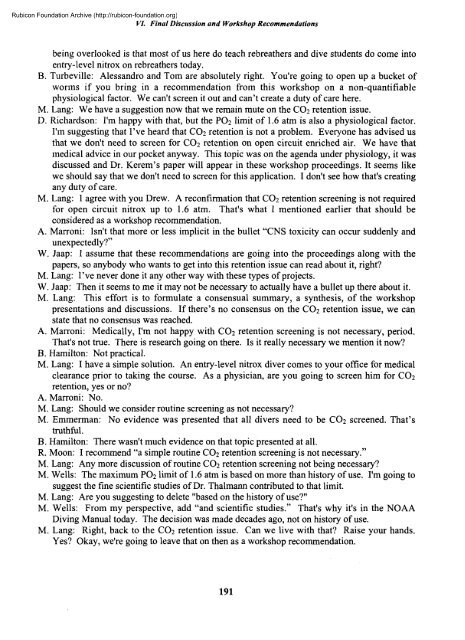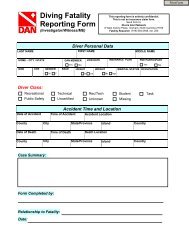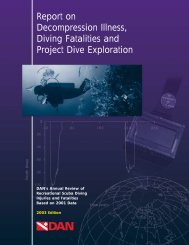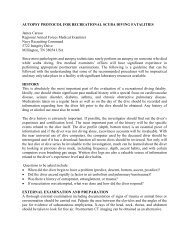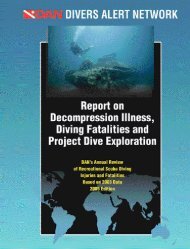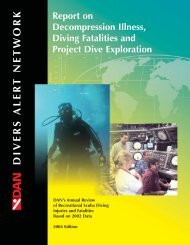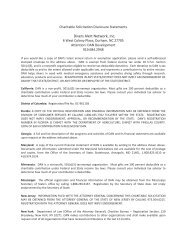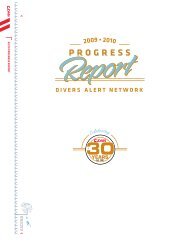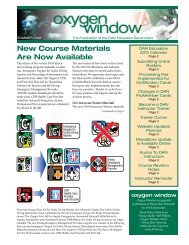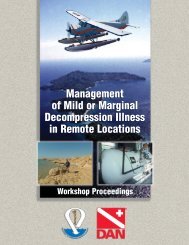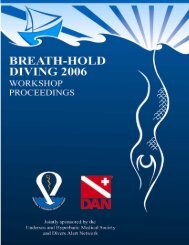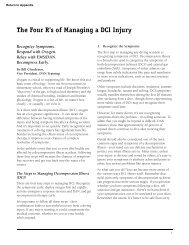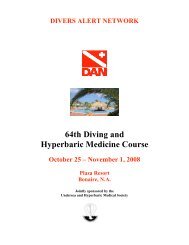Nitrox workshop dings - Divers Alert Network
Nitrox workshop dings - Divers Alert Network
Nitrox workshop dings - Divers Alert Network
Create successful ePaper yourself
Turn your PDF publications into a flip-book with our unique Google optimized e-Paper software.
Rubicon Foundation Archive (http://rubicon-foundation.org)VI. Final Discussion and Workshop Recommendationsbeing overlooked is that most of us here do teach rebreathers and dive students do come intoentry-level nitrox on rebreathers today.B. Turbeville: Alessandro and Tom are absolutely right. You're going to open up a bucket ofworms if you bring in a recommendation from this <strong>workshop</strong> on a non-quantifiablephysiological factor. We can't screen it out and can't create a duty of care here.M. Lang: We have a suggestion now that we remain mute on the CO2 retention issue.D. Richardson: I'm happy with that, but the PO2 limit of 1.6 atm is also a physiological factor.I'm suggesting that I've heard that CO2 retention is not a problem. Everyone has advised usthat we don't need to screen for CO2 retention on open circuit enriched air. We have thatmedical advice in our pocket anyway. This topic was on the agenda under physiology, it wasdiscussed and Dr. Kerem's paper will appear in these <strong>workshop</strong> procee<strong>dings</strong>. It seems likewe should say that we don't need to screen for this application. I don't see how that's creatingany duty of care.M. Lang: I agree with you Drew. A reconfirmation that CO2 retention screening is not requiredfor open circuit nitrox up to 1.6 atm. That's what I mentioned earlier that should beconsidered as a <strong>workshop</strong> recommendation.A. Marroni: Isn't that more or less implicit in the bullet "CNS toxicity can occur suddenly andunexpectedly?"W. Jaap: I assume that these recommendations are going into the procee<strong>dings</strong> along with thepapers, so anybody who wants to get into this retention issue can read about it, right?M. Lang: I've never done it any other way with these types of projects.W. Jaap: Then it seems to me it may not be necessary to actually have a bullet up there about it.M. Lang: This effort is to formulate a consensual summary, a synthesis, of the <strong>workshop</strong>presentations and discussions. If there's no consensus on the CO2 retention issue, we canstate that no consensus was reached.A. Marroni: Medically, I'm not happy with CO2 retention screening is not necessary, period.That's not true. There is research going on there. Is it really necessary we mention it now?B.Hamilton: Not practical.M. Lang: I have a simple solution. An entry-level nitrox diver comes to your office for medicalclearance prior to taking the course. As a physician, are you going to screen him for CO2retention, yes or no?A. Marroni: No.M. Lang: Should we consider routine screening as not necessary?M. Emmerman: No evidence was presented that all divers need to be CO2 screened. That'struthful.B. Hamilton: There wasn't much evidence on that topic presented at all.R. Moon: I recommend "a simple routine CO2 retention screening is not necessary."M. Lang: Any more discussion of routine CO2 retention screening not being necessary?M. Wells: The maximum PO2 limit of 1.6 atm is based on more than history of use. I'm going tosuggest the fine scientific studies of Dr. Thalmann contributed to that limit.M. Lang: Are you suggesting to delete "based on the history of use?"M. Wells: From my perspective, add "and scientific studies." That's why it's in the NOAADiving Manual today. The decision was made decades ago, not on history of use.M. Lang: Right, back to the CO2 retention issue. Can we live with that? Raise your hands.Yes? Okay, we're going to leave that on then as a <strong>workshop</strong> recommendation.191


